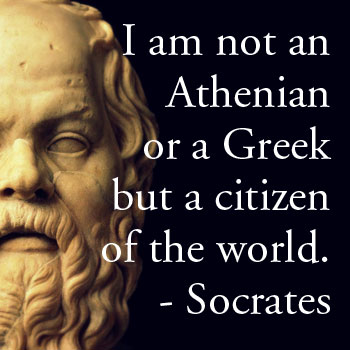 What Socrates was saying if applied to religion was that we are all One and that the highest form of religious expression is to transcend religion itself. In the paradigm shift involved with transcending religion, we would do well to include all the universal spiritual principles that are common to all religions. This is what the process of transcend and include means.
What Socrates was saying if applied to religion was that we are all One and that the highest form of religious expression is to transcend religion itself. In the paradigm shift involved with transcending religion, we would do well to include all the universal spiritual principles that are common to all religions. This is what the process of transcend and include means.
Again, it is not the purpose of this blog to spell out the details of what the religion of Oneness would include since that has been done in such books as The Essential Unity of All Religions by Bhagavan Das and The Truth is One by Henry James Forman and Roland Gammon. Instead, we are seeking to grasp the consequences of failing to realize this Oneness and to find a process by which we can realize the fruits of transcending religion and ending the violence caused by the failure to understand the universality of religious truth. As Rachel Naomi Remen says, “Religion is a bridge to the spiritual, but the spiritual lies beyond religion.”
We can, however, take a brief look at some beliefs, attitudes and values that we might take with us into the context of Simple Reality. Buddha has some ideas over 2,500 years ago that are still valid today.
- He advocated a religion devoid of authority. Power had corrupted the Hinduism of his time as it has corrupted the Christianity of today.
- He wanted the abolition of pointless and ineffective ritual. “They are trappings and rigamarole, irrelevant to the hard, practical job of ego reduction and spiritual release.
- He discouraged metaphysical speculation on such things as the “afterlife.” He was a pragmatist and wanted to keep the focus on relieving human suffering in this life.
- He saw tradition as a hindrance. “Do not ye go by what is handed down, nor on the authority of your traditional teachings.”
- He rejected such notions as reincarnation, or “salvation” through the auspices of a savior or guru. He affirmed the ability of each and every person regardless of caste or karma to attain enlightenment in the present life. “Work out your own salvation with diligence.”
- He did not have room in his religion for miracles or the supernatural. These only distracted from the practical work that the individual person must do to escape the suffering cause by being “asleep.”
We must reach deep within to activate our own prophet archetype. That inner prophet (intuition) will then spring to life, not to point out our sins, but to help us realize that our suffering is attributable to our being unconscious. The ageless clarion call is to “wake up.” We can’t repent (change our self-destructive behavior) until we first wake up. We cannot change the “error of our ways” until we see that the errors of our ways need changing. What is called for are insights and realizations. For that to occur we need the prophet within us to scale the windswept heights of Mt. Olympus and rail at the gods. “We have come to occupy your temples. We will be our own gods now. We have come to fulfill the prophecy, ‘ye are gods.’”
___________________________________________________________
References and notes are available for this essay.
Find a much more in-depth discussion in books by Roy Charles Henry:
Who Am I? The Second Great Question Concerning the Nature of Reality
Where Am I? The First Great Question Concerning the Nature of Reality
Simple Reality: The Key to Serenity and Survival


